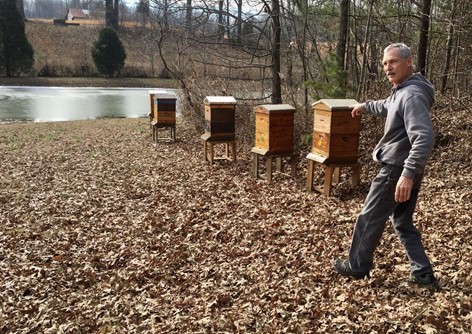Buzz Thrill: Retired educator using science background for beekeeping ‘hobby’
Steve Hahus, a retired teacher and beekeeper, walks through his Utica home’s backyard where six of his 13 hives are located. Hahus, who is also the president of the Green Valley Beekeepers Association, has been a beekeeper for 11 years.
Eleven years after purchasing his first beehive, Steve Hahus still considers his beekeeping a hobby.
But it’s not uncommon for the 62-year-old retired Apollo High School (Kentucky) teacher to field calls about how to care for honey bees, build his own wooden boxes for his hives and collect swarms from around the county.
During his time at AHS, Hahus taught biology, anatomy, physiology, microbiology, zoology and outdoor education.
“I had a really good background for beekeeping, I guess you could say,” Hahus said. “All of that stuff is involved in beekeeping.”
Hahus’ interest has gone beyond backyard beekeeping.
He spent three years tracking honey bees to see what types of trees and plants they collected nectar and pollen from.
Hahus called honey bees “extreme generalists,” which is the ability to thrive in a wide variety of environmental conditions and make use of a variety of different resources.
“I walked I don’t know how many miles and hours — all over — looking to see what bees were collecting from,” Hahus said. “It’s over 80 plants.”
Photos of all of the plants that Hahus documented can be found at greenvalleybeekeepers.org/plants-for-honey-bees.
In January, Hahus became president of the Green Valley Beekeepers Association.
His involvement with beekeeping and the local association started with a fellow teacher.
“A friend talked me into it; Obbie Todd, who I taught at Apollo with,” Hahus said. “He had bees, and he kept aggravating me and aggravating me.”
That persistence from Todd led Hahus to buy one hive in 2011 from a local beekeeper.
And since then, Hahus has had as many as 15 hives, which are now down to 13 — 12 of which he maintains on his Utica property. The other hive is kept at his brother’s home.
“I catch swarms, and that’s where I got all my other bees,” Hahus said. “Last year, I caught 17. I caught six here, and the rest of them were from people who called me and had swarms around their houses. It’s a good way to get free bees, and a lot of free bees, if you want them.”
Hahus added that swarms usually occur between late and mid-May.
“That’s how bees reproduce and establish more hives — they swarm,” Hahus said.
But before honey bees can swarm, the hive must survive the winter.
During the winter months, honey bees — as many 20,000 — will cluster together to generate heat and will not break cluster until the outside temperature gets around 55 to 60 degrees.
Hahus said the bees will even starve to death before they will break cluster, which is why he monitors his hives’ food levels on mild winter days that allow the honey bees to break cluster to forage for food. If the hives are low on food, he can add a frame of honey or sugar boards to the box.
And to ensure his hives survive the winter, Hahus said there are three keys — keep them from losing a lot of heat, add food when necessary and treat them for Verroa mites, an external parasitic mite that attacks and feeds on honey bees.
“In 10 winters, I’ve only lost one hive, so I know it works,” Hahus said.
Hahus also extracts honey, which he bottles and sells, from his hives twice a year — in June and September. He also sells hives and queens.
Along with raising honey bees, he builds his own wooden bee boxes known as superstructures, or “supers” for short. It’s where the hives live and store their honey.
“People give me scrap lumber, so I don’t have to buy lumber,” said Hahus, adding that he applies deck stain to preserve the supers longer.
When he started attending Green Valley Beekeepers Association meetings, Hahus said there were about 12 people. But now their numbers have increased to around 80.
Hahus credited immediate past president Jim Mason for helping expand the group.
“When it was in that feeble state, he really did a good job of promoting us,” Hahus said.
Hahus said he’s come to enjoy introducing others to beekeeping, which has given him “something to do.”
“I’m retired, and I guess this is what you’re supposed to do when you’re retired,” Hahus said.
https://www.messenger-inquirer.com/features/buzz-thrill-retired-educator-using-science-background-for-beekeeping-hobby/article_51e865b3-1bcc-5095-bd88-f0ff4f1e5e11.html
Don Wilkins, dwilkins@messenger-inquirer.com, 270-691-7299







